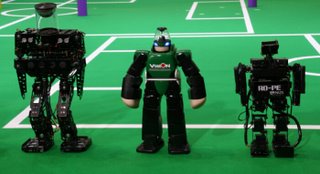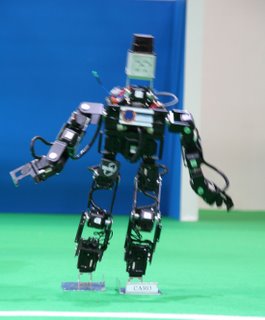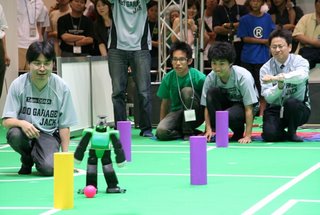Short introduction
 The official goal of the RoboCup[1] initiative is: “By the year 2050, develop a team of fully autonomous humanoid robots that can win against the human world soccer champion team.” The project entails development of soft computing, sensor-fusion, robotics and other related branches of science. Thanks to the clearly specified goal which is far beyond the contemporary science abilities it can bring many innovations applicable in industry as well as in social live.
The official goal of the RoboCup[1] initiative is: “By the year 2050, develop a team of fully autonomous humanoid robots that can win against the human world soccer champion team.” The project entails development of soft computing, sensor-fusion, robotics and other related branches of science. Thanks to the clearly specified goal which is far beyond the contemporary science abilities it can bring many innovations applicable in industry as well as in social live.
Main constrains:
 The official goal of the RoboCup[1] initiative is: “By the year 2050, develop a team of fully autonomous humanoid robots that can win against the human world soccer champion team.” The project entails development of soft computing, sensor-fusion, robotics and other related branches of science. Thanks to the clearly specified goal which is far beyond the contemporary science abilities it can bring many innovations applicable in industry as well as in social live.
The official goal of the RoboCup[1] initiative is: “By the year 2050, develop a team of fully autonomous humanoid robots that can win against the human world soccer champion team.” The project entails development of soft computing, sensor-fusion, robotics and other related branches of science. Thanks to the clearly specified goal which is far beyond the contemporary science abilities it can bring many innovations applicable in industry as well as in social live.  - the robot proportions should be as close as possible to that of human being (exactly specified in rules[2]).
- each of the implemented sensory systems must have its equivalent in human being. Only the vision and audio sensors are allowed for localization and all the environment recognition purposes (no infrared, radar and ultrasonic sensors are allowed). In addition, these sensors should be mounted in places of their equivalents in human being.
- the robot proportions should be as close as possible to that of human being (exactly specified in rules[2]).
- each of the implemented sensory systems must have its equivalent in human being. Only the vision and audio sensors are allowed for localization and all the environment recognition purposes (no infrared, radar and ultrasonic sensors are allowed). In addition, these sensors should be mounted in places of their equivalents in human being.
- real time vision recognition – the robot in order to play soccer must be able to localize and track the play ground, goals, global localization as well as the exact posture of other players and finally the ball.
- dynamic gait – in order to be able to speed a human being robot must be able to run, what by its definition enforces use of dynamic gait.
- multi-agent systems – as soccer is team game the cooperation between team members is crucial for winning the game. The particular agent must know its position and function in the whole game.
Current stage:
 During the last competition in Osaka 2005 robots have been divided into two size groups and had to face such events as: penalty kick, 2 vs. 2 and technical challenge. In upcoming competition in Germany there will be additional ball dribbling and ball passing events. These interested can find the rules here.
After reading this blog you surely have a lot of questions. I have done it on purpose! Perhaps you think the final game will never take place or it is waste of money to do research in this area. Don't hesitate just write it in comments!!
During the last competition in Osaka 2005 robots have been divided into two size groups and had to face such events as: penalty kick, 2 vs. 2 and technical challenge. In upcoming competition in Germany there will be additional ball dribbling and ball passing events. These interested can find the rules here.
After reading this blog you surely have a lot of questions. I have done it on purpose! Perhaps you think the final game will never take place or it is waste of money to do research in this area. Don't hesitate just write it in comments!!Source:
6 comments:
FIRA(Federation of international robot association) also has Hurosot Competition.www.fira.net.
Also, can you in detail illustrate
what those humanoid robots need to achieve or perform during the Robocup comepetition?
Also thousands of dollars spent on those robots, is there any reserach value? can you state some to clear some of the doubts
u0205352 Lim Lipien
Basically, I also feel that with the advancement of technology, the game between human and robot will become a reality in the future. The question of speculating which side will be the winner will be a much debatable issue now till 2050.
However, I believe very strongly that the talent,looks, charisma and attributes of famous human soccer players such as Wayne Rooney,Ronaldinho can never be found in robot soccer players.The reason is simply because the talent of these individuals is simply irreplacable and unique. This is one of the important reasons which make the human football game so attractive nowadays to watch. Thus, I feel that the clash between two human opposition sides will be still be a much nicer game. Do anyone agree with my view?
u0204734
Woo Handa, Raymond
Wow, the match between human and robots should be very interesting!!! It is quite interesting to find out whether the robots have the capability and technique to win the human counterpart.
However, I still very convinced that the human soccer game is still a beautiful game to watch. The reasons are that there are many controversial referee decisions, controversial goals are being allowed and the diving of players who attemp to cheat under the eye of referee. This make the game more interesting to watch and
world cup 2006 germany is approaching. I think it is a much anticipated event for the soccer fans out there.
u0204593 Chiam Lee Chuan
I would agreed with Lipien. While the idea of robots is exciting, but i stongly doubt that robots would be ever produce that level of creativity and originality that a human is only capable of. Soccer robots are only programmed to score goal in a most efficient way, thus they will alway be lacking in the unpredictable style of play exhibit by human and that's the thing we enjoyed about soccer.
U0303893 Aung Myo Lwin, well robot soccer, that is one of the growing research area in robotics. I don't want to say that it is impossible to have a humanoid soccer team at year 2050. However, it will be a very challenging task for world robotics society. There are some considerations that I want to post here. First one is, will the robot be able to tackle? will human dare to tackle robots? How robot will dispocesses the ball from the human? How about ball control? How about heading? Will robot do body push? Hianz...I can still come out a lot more questions, that is along way for humanoid advancements to reach such stage. I feel that not only in robotics technology advancements, other technology advancments such as communications, material science, embedded systems and so on. Anyway, I hope to watch a soccer game between human and humanoid.
u0204635 Tan Pei-En
Wow... Seems like humanoid soccer provokes a lot of interest..
I think the questions of individuality and creativity bely a much deeper philosophical question - what does it mean to be human?
Functionally, I think it is only a matter of time before an effective team of humanoids is assembled and designed to play soccer effectively. It could be 50 years, 100 years, or more, but conceptually there is no difficulty with the notion (although technically there are lots and lots of challenges).
But no matter how complex the robots get, all their behavior is just a causal result from initial states and the pre-programmed algorithm. Sure, the algorithm can be programmed to learn and become more adapted to the environment, but the point is that given a certain environment, there exists only one way which the robot will learn, and that is the direct result of the way it has been programmed.
To the untrained eye, the complex algorithms may allow the humanoid robot to exhibit behavior analogous to individuals. But insofar as we mean abstract things like free choice when we talk about individuality, it is just an illusion. Machines, no matter how complex, are still deterministic.
Think about it this way. Given the initial positions of the robot, the environment, and the way they have been programmed, the outcome of the game is COMPLETELY DETERMINED from the start. We just dont know it because it is too difficult to compute in practical. But conceptually, we know that everything is, so-called, predestined in a robot soccer game.
Thus, while it may be interesting to watch and scientifically beneficial to the world, give me the Rooneys, the Ronaldos and the Ruuds any day.
Could you feel exhilaration for a robot when it scores? Even if you do, it doesn't feel a thing. Can you empathize with the agony of the player whose attempted equalizer comes of the post at the 91st minute of the game, condemning his team to defeat, if it is just a robot? What about the sheer weight of responsibility that falls on the shoulders of each player when the game goes to penalties? Would you feel it, if underneath those shoulders were mere chips and circuitry?
So, by all means, experiment on humanoid soccer, try it out with humans for all you want, but don't touch the World Cup.
Leave the beautiful game alone. :)
Post a Comment